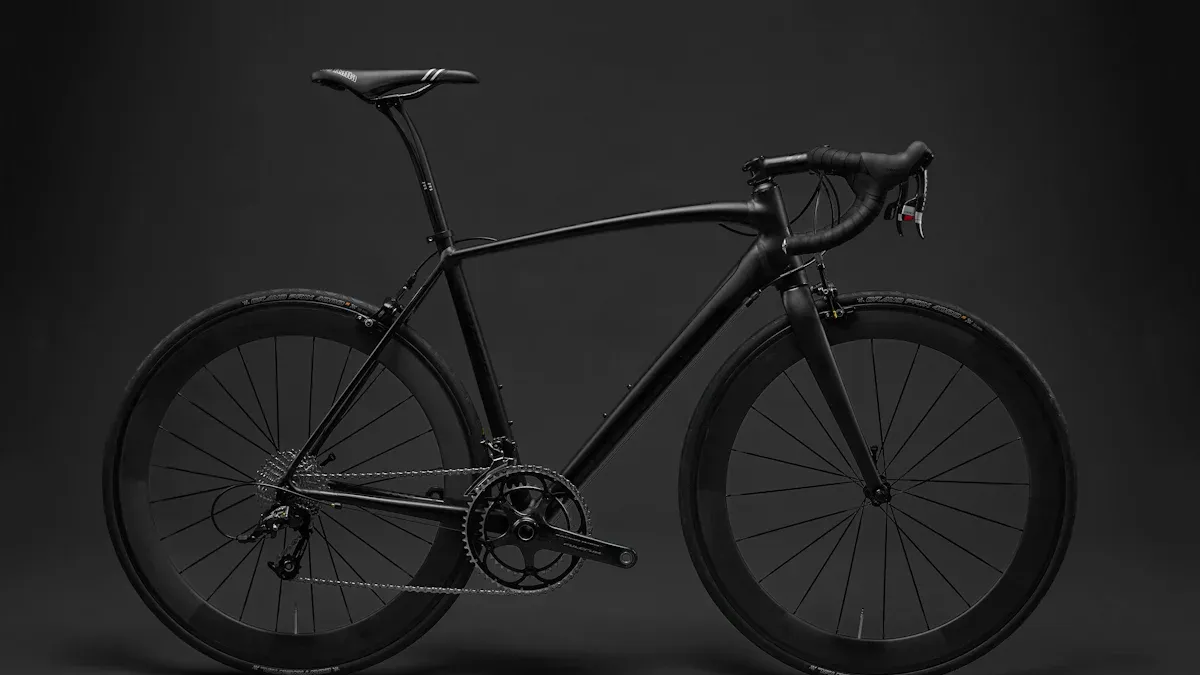
More and more bike riders are picking carbon monocoque bike frames. These frames have special benefits that improve your ride. They are lighter, stiffer, and reduce vibrations. That’s why they are getting popular. Also, the design options and lasting value are very appealing!
Key Takeaways
Carbon monocoque bike frames are very light. This helps you go faster and climb better. They are great for racing and steep hills.
The strong carbon frames help transfer power well. This means your pedaling energy turns into speed. You get better control and feel while riding.
These frames soak up bumps well. This gives you a smoother and more comfy ride on rough roads. You can ride longer without getting tired.
Weight

Weight is very important when you cycle. It affects how well you perform. Carbon monocoque bike frames are super light. This can really improve your ride. Let’s see how being lightweight helps with speed and climbing.
Acceleration
With a carbon monocoque bike frame, you will feel a big change in how fast you go. The lighter weight helps you speed up quicker than with regular aluminum or steel frames. In racing, every second matters. A lighter frame can really help.
High-Performance Road Racing: The lightness of carbon monocoque frames helps you go up hills fast and transfer energy quickly, which is key for racing.
Aerodynamic Time Trials: These frames cut down drag and soak up bumps, letting you go faster with less work, which is important in time trials.
Elite Training: Using these frames in training helps you get used to them, making you better in races.
Climbing Performance
Going up hills can be tough when cycling. Luckily, carbon monocoque bike frames do really well here too. Their light design helps you climb steep hills more easily. You will keep your speed and energy better than with heavier frames.
To show the weight differences, look at this table:
Frame Type | |
|---|---|
Carbon | 20-40 |
Aluminum | 48 (52 with paint) |
Steel | 61 (65 with paint) |
As you can see, carbon frames are much lighter than aluminum and steel ones. This weight benefit helps you climb better, so you can tackle tough hills without feeling heavy.
In professional races, weight clearly affects results. Carbon frames are made for aerodynamics, which is very important in racing. They provide the right stiffness, helping you push harder during sprints. Also, the comfort of carbon frames helps you feel less tired during long races. This lets you keep performing well throughout the event.
Stiffness

Stiffness is very important for how your bike works. When you ride a carbon monocoque bike frame, you will see that more stiffness means better power transfer. Let’s look at how this happens and what it means for your ride.
Power Transfer
With a stiffer frame, you can push harder without wasting energy. Here’s how more stiffness helps:
No Flex Under Load: The carbon monocoque design keeps the bike stiff no matter the size. This means when you pedal hard, the frame stays strong, so all your energy goes into moving forward.
Modern Standards: Features like BB90 and BBRight bottom brackets make the bottom bracket area stiffer. This means you get more power to the pedals.
Stable Front End: Integrated headsets help make the front end stiffer. This stability is very important during sprints, letting you keep speed without worrying about frame flex.
When you sprint, every bit of power matters. A stiffer frame makes sure your efforts turn into speed.
Handling
Stiffness also changes how your bike handles. A stiffer frame gives you better control, especially when going fast. Here’s what you should know:
Improved Control: A stiff fork and front end really help with handling. You’ll feel more connected to the road, which helps you turn and avoid obstacles with confidence.
Responsiveness: Stiffer frames give better control and quick reactions, especially for aggressive riding. You can respond fast to changes in the ground or direction.
Trade-offs: While stiffness is good, too much can hurt cornering grip and braking. It’s important to find the right balance for your riding style.
Here’s a quick look at how stiffness affects handling:
Aspect | Evidence |
|---|---|
Control and Responsiveness | Stiffer frames give better control and quick reactions, especially for aggressive riding. |
Excessive Stiffness | Too much stiffness can hurt cornering grip and braking. |
Rider Factors | The best stiffness may change based on rider power and riding style. |
Vibration Dampening
When you ride, the road can be bumpy. This is where the carbon monocoque bike frame really helps. These frames are great at absorbing shocks. They make your ride smoother than aluminum frames. Carbon fiber does a great job of reducing vibrations and bumps from the road. This means you can have a more comfortable ride, especially on rough surfaces.
Shock Absorption
The design of carbon frames balances stiffness and flex. This balance makes your ride more comfortable while keeping it efficient. You’ll see that carbon fiber transfers less vibration than aluminum. This is important for absorbing shocks. It helps reduce tiredness from that annoying ‘road buzz.’ You’ll like this feature on long rides, as it keeps you feeling fresh and ready to pedal.
Comfort
Riding a bike should be fun, right? With a monocoque frame, you get just that. Better shock absorption helps you handle rough roads without feeling every bump. You’ll notice that the vertical flexibility of these frames gives you a smoother ride. At the same time, lateral stiffness stops energy loss when you pedal hard. This mix means you can ride longer distances without discomfort.
In short, if you want a bike that keeps you comfy while performing well, a carbon monocoque bike frame is a great choice.
Design Flexibility
When you think about bike frames, design flexibility is very important. Monocoque frames are special not only for how they perform but also for how they look. You will see that these frames have smooth lines and a modern style that grabs attention. The sleek, continuous surface of a carbon monocoque frame gives it a unique look that makes it different from regular frames.
Aesthetic Appeal
The charm of a monocoque frame comes from its simple and elegant design. You can pick from many colors and finishes, which lets you show off your personality. Many riders love how these frames look while riding, making them a favorite among bike lovers.
Tip: When picking a frame, think about how its design matches your riding style and personal taste. A good choice can make your biking experience even better.
Customization
The customization options for carbon monocoque frames are really great. You can change your bike to fit your needs. Here’s a quick comparison with other frame types:
Feature/Aspect | Carbon Monocoque | Other Frame Types (Steel, Aluminum, Titanium) |
|---|---|---|
Build Process | One piece for high quality | Bonded tubes or welded parts |
Weight | Usually heavier | |
Very flexible in ride features | Limited options | |
Performance | High performance and stiffness | Varies by material and build |
Cost | Can be pricey | More affordable choices available |
Damage Resistance | Can get damaged easily | Usually more durable |
With a monocoque frame, you can change ride features like stiffness and comfort. This flexibility helps you create a bike that feels just right for you. Whether you are racing or just riding for fun, having a customized bike makes a big difference.
Long-term Value
When you buy a carbon monocoque bike frame, you are making a smart choice. You are not just getting a bike; you are getting something that lasts. Let’s see how these frames hold up over time.
Durability
Carbon monocoque frames can last about 10 years if you take care of them. This is a long time compared to aluminum and steel frames. Here’s a quick look at how they compare:
Carbon Frames: High-quality carbon frames usually break less often based on what users say. But, they can get damaged easily and may break badly if hit hard.
Aluminum Frames: These frames are strong and last a long time. They absorb shocks well but might not feel as comfy on long rides.
Steel Frames: Steel frames are very strong and don’t rust easily. They are simple to fix because you can weld them without making them weak.
Even though carbon frames need careful handling, they often perform better in road cycling.
Cost-effectiveness
You may ask if spending more on a carbon monocoque frame is worth it. The answer is yes! They might cost more at first, but they last longer. This means you won’t have to buy new ones as often. Also, taking care of them usually costs less than for aluminum or steel frames.
Maintenance: Fixing carbon frames is trickier than fixing steel or aluminum. Aluminum frames can be hard to weld, but steel frames are easier to repair. So, if your carbon frame gets damaged, it might cost more to fix than an aluminum or steel one.
In the end, the mix of being durable and needing less maintenance makes carbon monocoque frames a smart pick for serious cyclists.
In short, carbon monocoque bike frames have many great benefits. They are very light, help transfer power better, and give you a smoother ride. Their sleek design and options for customization also make them unique.
If you want a bike that mixes performance and style, think about getting a carbon monocoque frame for your next ride!
Benefit | Description |
|---|---|
Carbon fiber frames are much lighter than regular materials, making them more efficient. | |
Efficient Power Transfer | Stiffer frames reduce energy loss, sending your pedaling power straight to the wheels. |
Enhanced Ride Quality | Vibration-damping features make the ride smoother, cutting down discomfort from bumps. |
Aerodynamic Advantages | Allows for better aerodynamic shapes, lowering wind resistance and boosting speed. |
Design Flexibility | Provides options for customization with cool colors and finishes. |
Corrosion Resistance | Not likely to rust, which is great for areas near the coast. |
Sustainability | Long-lasting frames mean you won’t need to replace them often, helping the environment. |
FAQ
What makes carbon monocoque frames better than aluminum or steel?
Carbon monocoque frames are lighter and stiffer. They also reduce vibrations, which makes your ride better.
How long do carbon monocoque bike frames last?
If you take care of them, these frames can last about 10 years. This makes them a strong choice for serious cyclists.
Can I customize my carbon monocoque bike frame?
Yes, you can! You can pick colors and finishes. You can also change ride features to match your style and needs.
See Also
Discover Why Cyclists Prefer Carbon Frames in 2025
Experience Lighter And Smoother Rides With Carbon Fiber
Understanding The Innovative Technology Of Carbon Bike Frames
